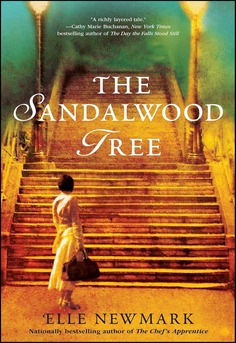|
1. The Sandalwood Tree begins with a quote from Adela Winfield: "Death steals everything but our stories." Later Evie paraphrases this as "Our stories are all we have." What do you think of this? Do you agree? Do you think our stories are the only things that last?
2. The novel tells two stories in alternating chapters, both set in the same home 90 years apart. Did you prefer one storyline or set of characters to the other? Did you find one more interesting or compelling? Why?
3. Evie says, "If you understand the lunatic nuances in keeping up appearances, you'll understand why I spent an insane amount of time fighting dust and dirt in India." and later, "I couldn't fix our inside, so I fixed our outside. I vanquished dirt and disorder wherever I found it, and felt better, for a while." Do you think Evie's impulse to control what she can in order to compensate for the things she cannot is a typical human reaction? What do you think she gains and loses by focusing on these outward problems instead of the real ones?
4. The British characters often mock the Indians' superstitions throughout the novel. Is Evie's need for order a superstition in itself? Do you think there's a difference between her need for order and the natives' need for their rituals? Are they driven by the same impulses and desires?
5. One of the major themes of The Sandalwood Tree is the resilience of the Indian people. When Evie first arrives in India, she says "I wanted to...ferret out the mystery of [India's] people. I wanted to know how India managed to hang on to her identity in spite of multitudes of foreign conquerors slogging through with new gods and new rules." What did you think of this ability to "bend without breaking." Do you think it's universal to human nature? Unique to the Indian people? Something developed over time out of necessity?
6. Evie says, "Denial is the first refuge of the frightened, and it works, for a while." What does this quote mean to you? Do you agree with Evie? Where in the novel do the characters choose denial over facing reality? Does it help or hurt them?
7. Elle Newmark uses foreshadowing throughout the novel, hinting at things to come. Evie says of Billy's stuffed dog, "I wouldn't have taken Spike away even if I'd known the trouble the toy was going to cause later. But nobody could have seen that coming." What other instances of foreshadowing did you notice?
8. Evie and Martin speak the same language, but they barely communicate. Yet Evie is able to make herself understood with her students, servants, and the shopkeepers she meets throughout her day using limited language and body movements. For much of the novel, Adela and Felicity can communicate only through letters, and later Felicity and Jonathan communicate through their poetry. What do you think this says about communication? Do you think if the intent is there, someone can always get his or her point across?
9. Felicity and Adela live in a time where a woman had very few choices, and society had very specific expectations of them. In spite of these, they manage to carve out nontraditional lives, vowing to "scrap the rules and live a life of joy, no matter what the price." What do you think makes them different from the other women of the era, able to make these choices? Do you think the price they paid for those choices was too high?
10. Throughout The Sandalwood Tree there is a huge dichotomy between the rich foreigners, with their servants and extravagance, and the abject poverty of so many of the natives. Did this disparity bother you? Do you think it's inevitable that there be such a difference between classes?
11. The love affairs in the novel were all scandalous for their time: the interracial relationship between Jonathan Singh and Felicity, Adela's lesbianism, Martin and Evie's inter-faith marriage. What does it say about the characters that they were all able to defy expectations and conventions? Did you find their decisions shocking?
12. Evie says, "In 1945 they called it combat fatigue, but in World War One they had called it shell shock, which is more accurate. After Vietnam they started calling it Post Traumatic Stress Disorder. Stress? Please. The names for this mental illness became more sanitized with every war." Martin is carrying serious scars from his time in the war, and as a result closes Evie out and starts taking dangerous risks in his work. Do you think a person ever completely heals from seeing the atrocities of war? Do you think enough is done to care for veterans when they return?
13. Evie refers to India as a "spiritual carnival complete with sideshows." The religious practices, divisions, and biases of the characters are a major theme in The Sandalwood Tree. Do you think it's possible for conflicting faiths to live in harmony, or is the war in the name of religion that plagues human history inescapable?
14. Most of the British families in the novel have travelled to India only to recreate their lives at home, down to the same shops, food, and traditions. Why do you think this is? Do you think this is a reasonable way to create a comfortable environment for themselves, or a waste of an opportunity to experience something different? Do you think this insistence on holding on to their lifestyles is driven more by arrogance or fear?
15. Martin cannot forgive himself for the things he did, and didn't do, during wartime. It is not until he tells Evie what happened, and she forgives him, that he can begin to forgive himself. Do you think Martin would be able to find any peace with his memories if he hadn't shared them with Evie? Or do you think it's only by not holding on to secrets that people can begin to get over them?
16. Felicity's pregnancy out of wedlock must be hidden, and Evie has to drop out of college when she becomes pregnant. "In 1941 pregnant women simply didn't belong in school; they barely belonged in public." Do you think our society's feelings toward pregnancy and childbirth have changed dramatically, or do you think there's still a stigma attached to pregnancy in some ways, say to unwed mothers or pregnant women in positions of power or authority?
17. Harry quotes Gandhi as saying, "Poverty is the worst form of violence." What do you think of this statement?
Discussion Questions by PBR

|

















